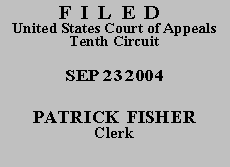

| ALEX KIVUMBI,
Petitioner, v. JOHN ASHCROFT, Respondent. |
|
Petitioner seeks review of a decision of the Board of Immigration Appeals (BIA) dismissing her appeal from the denial of her application for asylum, withholding of removal, and relief under the Convention Against Torture Act. We have jurisdiction, and we deny the petition for review.
Petitioner is a native and citizen of Uganda. In her asylum application, she claimed she was a member of the Uganda Human Rights Activists, that as a photojournalist she took photographs of human rights abuses, and that her mother, brother and husband were murdered by Ugandan soldiers. Admin. R. at 313. She further claimed that in July of 1995, she was "detained without trial," tortured, and raped by Ugandan soldiers. Id. at 314. Petitioner entered the United States in December of 1995 as a B-1 visitor. Her authorized stay expired in November of 1997. Id. at 147.
Following a hearing, the immigration judge (IJ) denied asylum, withholding of removal and relief under the Convention Against Torture Act, but granted voluntary departure. Id. at 51. The BIA summarily affirmed the IJ's decision without opinion. Id. at 2.
In her petition for review, petitioner raises the following issues:
A. Whether an applicant for asylum who followed the misguided instructions of a lay advisor from her native country and submitted an application which contained inaccuracies and exaggerations may be allowed to retract those statements and offer testimony which is accepted as credible.
B. Whether it is appropriate and consistent with Due Process rights for an Immigration Judge to attach significant weight to the written assessment of an asylum officer who is not subject to cross-examination.
C. Whether an applicant who has made prior false statements must submit corroboratory evidence to meet her burden of proof, regardless of whether obtaining such evidence is reasonably possible or not.
D. Whether summary dismissal of Petitioner's appeal was appropriate under the regulations governing Board of Immigration Appeals procedures and, if so, whether these procedures violated her Due Process rights.
Petitioner's Br. at 7-8.
When the BIA summarily affirms the IJ, we review the judge's decision as if it were the BIA's. See Tsevegmid v. Ashcroft, 336 F.3d 1231, 1235 (10th Cir. 2003). We do not weigh the evidence, nor do we evaluate the credibility of witnesses. Yuk v. Ashcroft, 355 F.3d 1222, 1233 (10th Cir. 2004) (citing Woldemeskel v. INS, 257 F.3d 1185, 1189 (10th Cir. 2001)). In addition, the BIA's factual findings "are conclusive unless the record demonstrates that any reasonable adjudicator would be compelled to conclude to the contrary." Tsevegmid, 336 F.3d at 1235 (quotation omitted). The IJ must give "specific, cogent reasons" for a determination that petitioner lacks credibility. Sviridov v. Ashcroft, 358 F.3d 722, 727 (10th Cir. 2004).
From the outset, the parties have agreed that this case rests almost exclusively on petitioner's credibility, and the IJ simply did not believe her testimony. She submitted no evidence in support of her claims other than the several versions of the events underlying her claim of past persecution.
The IJ carefully and thoroughly outlined the many discrepancies and inconsistencies in petitioner's story as described in her application, the asylum interview and her hearing testimony. Admin. R. at 143-51. Moreover, petitioner admits she "altered her story," Petitioner's Br. at 19, but suggests that the IJ gave the asylum officer's assessment report weight "grossly disproportionate to its probative value." Id. at 20. Contrary to petitioner's argument, however, the IJ gave appropriate consideration to her hearing testimony, her asylum application, and the asylum officer's assessment as support for his findings that petitioner had been "giving false testimony throughout her history in the United States." Id. at 48.
Petitioner offers vague and generalized excuses for not having obtained corroboratory evidence in support of her application, id. at 21-22, but expresses no specific reasons she did not (or could not) do so. She claims to have "offered reasonable explanations for the inconsistencies in her narrative," id. at 22, but again provides no specific citations to those inconsistencies or to her explanations. Simply claiming that some "are the type of inconsistencies which can readily be explained due to confusion," id. at 20, is insufficient. Because the IJ found as a factual matter that petitioner was not credible and no reasonable adjudicator would be compelled to conclude to the contrary, see 8 U.S.C. § 1252(b)(4)(B), these findings are conclusive.
Finally, petitioner argues that the BIA erred in summarily affirming the IJ's decision. This argument is foreclosed by recent Tenth Circuit authority. See Sviridov, 358 F.3d at 726-27; Batalova v. Ashcroft, 355 F.3d 1246, 1253-54 (10th Cir. 2004); Yuk, 355 F.3d at 1230-32. Petitioner also maintains that review by a single board member was inappropriate in this case. It makes no difference whether the BIA acted through a single member, since we can directly and fully review the IJ's decision, which the BIA adopted. See Batalova, 355 F.3d at 1253 n.8. As indicated above, our review reveals no error in the IJ's decision. Thus, the BIA appropriately streamlined this case. See Sviridov, 358 F.3d at 727 (holding this court can review Board member's decision to streamline).
The petition for review is DENIED.
Entered for the Court
Circuit Judge
*. This order and judgment is not binding precedent, except under the doctrines of law of the case, res judicata, and collateral estoppel. The court generally disfavors the citation of orders and judgments; nevertheless, an order and judgment may be cited under the terms and conditions of 10th Cir. R. 36.3.